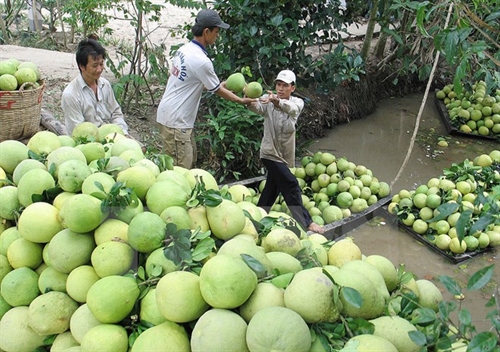 Society
Society

Four provinces in the Cửu Long (Mekong) Delta sub-region, located between the Tiền and Hậu rivers, plan to establish linkages to increase production of green-peel and pink-flesh grapefruit as well as coconuts, key fruits grown in the area.
 |
| Traders buy green-skin and pink-flesh grapefruits in the Cửu Long (Mekong) Delta province of Tiền Giang. — VNA/VNS Photo Trung Hiếu |
HCM CITY — Four provinces in the Cửu Long (Mekong) Delta sub-region, located between the Tiền and Hậu rivers, plan to establish linkages to increase production of green-peel and pink-flesh grapefruit as well as coconuts, key fruits grown in the area.
The four provinces, Bến Tre, Tiền Giang, Vĩnh Long and Trà Vinh, have about 110,000 ha of coconut trees with annual output of more than 1 million coconuts. They produce 15,000ha of green-peel and pink-flesh grapefruit with annual output of 156,000 tonnes a year.
The cultivation areas of coconuts and grapefruit in the delta are scattered and on a small scale, which has caused problems in producing a large quantity of high-quality fruits for export.
Speaking at a seminar held in Bến Tre on August 31, Cao Văn Trọng, chairman of Bến Tre Province People’s Committee, said the committee would work with authorities of the other three provinces to set up a linkage plan from now to the end of next year.
Bến Tre would also improve connections between farmers and processors to establish specialised cultivation areas and brand names for the two fruits.
Connections would also be established in trade and investment promotion, research, market development and consumption.
Phan Hoài Phong, a representative of the Bến Tre-based Hương Miền Tây Private Enterprise, which specialises in trading green-peel and pink-flesh grapefruit, said that grapefruit had been exported to many markets, including the EU, China and Canada.
Potential markets exist in the Middle East, Russia and France, but Hương Miền Tây has decided not to sign export contracts because of a supply shortage.
Hương Miền Tây has signed contracts with 27 co-operative teams in Bến Tre that cultivate a total of 110,000 ha of green-peel and pink-flesh grapefruit, with an annual output of 200 tonnes a year.
The quantity of green-peel and pink-flesh grapefruit that meet criteria for export accounts for only 13-15 per cent of total output, according to Phong.
The enterprise does not have enough standard grapefruit for export orders, so most green-peel and pink-flesh grapefruits purchased by Hương Miền Tây are sold in the domestic market.
Phong said the connections among farmers, companies, scientists and local governments, especially linkages among grapefruit-cultivating provinces, were needed for better grapefruit cultivation.
Lê Văn Nghị, deputy chairman of the Việt Nam Co-operatives Alliance, said that provinces should set up co-operatives to establish linkages in the sub-region.
Co-operatives in each province which operate effectively can set up a co-operative alliance, which would then be part of the sub-region’s co-operative alliance for production linkages.
Deputy Minister of Agriculture and Rural Development Trần Thanh Nam said the sub-region provinces should draft regulations on linkages soon.
He said the sub-region should re-organise production of fruit under a co-operation model composed of companies, co-operatives and farmers. It should also undertake research to establish wholesale markets for the fruits. —VNS




